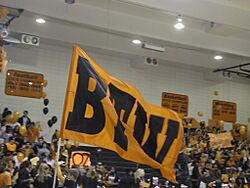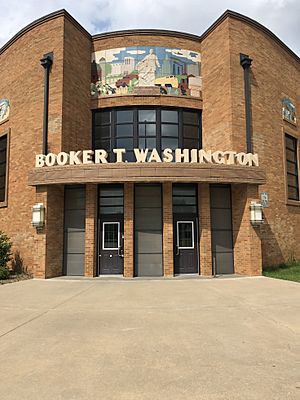Booker T. Washington High School (Oklahoma) facts for kids
Quick facts for kids Booker T. Washington High School |
|
|---|---|

Booker T. Washington Pep Rally
|
|
| Location | |
|
1514 East Zion Street
, 74106
|
|
| Coordinates | 36°11′18″N 95°58′16″W / 36.188205°N 95.971009°W |
| Information | |
| Type | |
| Established | 1913 |
| School district | Tulsa Public Schools |
| NCES District ID | 4030240 |
| CEEB code | 373590 |
| NCES School ID | 403024001583 |
| Principal | Melissa Woolridge, PhD |
| Teaching staff | 59.28 (FTE) |
| Grades | 9-12 |
| Number of students | 1,285 (2023-2024) |
| Student to teacher ratio | 21.68 |
| Campus | Urban |
| Color(s) | Orange and Black |
| Athletics | Basketball, baseball, cross country, football, soccer, softball, swimming, tennis, volleyball, track |
| Athletics conference | OSSAA Class 5A |
| Mascot | Hornets |
| USNWR ranking | 1,153 |
Booker T. Washington High School is a high school in Tulsa, Oklahoma. It is named after Booker T. Washington, an important African-American leader in education. The school is part of the Tulsa Public Schools system.
Contents
About Booker T. Washington High School
Booker T. Washington is a public high school. It is a special type of school called a "magnet school." This means students are accepted based on their grades and school attendance, not just where they live. To make sure students come from different backgrounds, the school gives special consideration to those from certain neighborhoods.
School History
When Oklahoma became a state, separate schools were created for African-American children. The first such school in Tulsa was a small wooden building built in 1908. It taught students from first to eighth grade.
In 1913, Booker T. Washington High School officially opened. It started with only fourteen students and two teachers. The first principal was E.W. Woods. The original school building was in the Greenwood area of Tulsa. By 1920, a larger brick building replaced the first small high school.
The Tulsa Race Massacre of 1921
The high school was not destroyed during the Tulsa Race Massacre in 1921. After the event, the American Red Cross used the school building to help people. About 2,000 people found temporary shelter there. The Red Cross also set up a hospital and other medical services to care for those affected.
Desegregation and Changes
For many years, schools in Tulsa were separated by race. This changed after the U.S. Supreme Court ruled that racial segregation was against the law in 1954. In the early 1970s, some students started a program to voluntarily transfer to Booker T. Washington. This showed that students from different backgrounds could learn together.
In 1973, Booker T. Washington High School became a key part of Tulsa's plan to desegregate schools. It became a magnet school, meaning students from all over the district could apply. For a long time, the school tried to have a balanced mix of students from different racial backgrounds.
However, in 2003, the Supreme Court made new rules about how schools could accept students. Booker T. Washington High School changed its system to follow these new rules. The goal was still to have a diverse student body.
Booker T. Washington Today
The current Booker T. Washington High School building opened in 2003. It is a large, modern school that cost $25 million to build. Part of the old building was saved to remember the school's long history.
Booker T. Washington was one of the first high schools in Tulsa to offer Advanced Placement (AP) courses. These are college-level classes. The school also started offering the International Baccalaureate (IB) program in 1983. Both programs help students prepare for college.
Academics and Learning
Booker T. Washington High School is known for its strong academic programs. It is approved by the International Baccalaureate Organization (IBO) to offer the IB Diploma. Students can also take many Advanced Placement courses. These advanced classes are offered in subjects like English, math, science, and foreign languages.
In 2005, a study looked at high-performing schools with diverse student populations. The study found that Booker T. Washington was doing a great job preparing students for college. It highlighted the school's qualified teachers and helpful support for students.
The school offers five different world languages: Spanish, French, German, Chinese, and Japanese. Many students at Booker T. Washington study a foreign language. The school also has exchange programs with students from many countries around the world.
In 2010, Newsweek magazine ranked Booker T. Washington 74th among the top 100 public high schools in the US. This ranking was based on how many students took advanced tests like AP or IB exams.
Academic Achievements
Booker T. Washington High School has won many state championships in academic competitions:
- Academic Bowl 20 times: 1991, 1992, 1994, 1996, 1997, 1999, 2000, 2002, 2003, 2004, 2006, 2007, 2008, 2011, 2012, 2013, 2016, 2019, 2020, 2021
- Speech And Debate 10 times: 1978, 1979, 1996, 1997, 1998, 1999, 2000, 2012, 2013, 2015
The school has also won national championships:
- Academic Bowl: 1992 and 2008
- NFL Lincoln Douglas Debate: 1983
- NFL Poetry Interpretation: 1998
- NFL United States Extemporaneous Speaking: 2013, 2014, 2016
Athletics and Sports
Booker T. Washington High School has won 53 state championships in various sports. Many former athletes from the school have gone on to play in the NFL (National Football League) and NBA (National Basketball Association). The school's football team plays its home games at S.E. Williams Stadium.
In 2011, the school's boys' basketball team was ranked among the top 20 basketball teams in the nation.
State Sports Championships
- Boys' Basketball 16 times: 1973, 1977, 1981, 1984, 1985, 1986, 1987, 1995, 1996, 1997, 1999, 2001, 2002, 2010, 2011, 2019, 2025
- Girls' Basketball 3 times: 2008, 2009, 2013, 2017
- Football 9 times: 1967, 1968, 1969, 1971, 1973, 1984, 2008, 2010, 2017
- Boys' Soccer 7 times: 1985, 1992, 1997, 1998, 2000, 2001, 2008
- Girls' Soccer: 2018, 2019
- Boys' Swimming 3 times: 1981, 1985, 2018
- Boys' Track 4 times: 1970, 1979, 1982, 1984
- Girls' Track 9 times: 1974, 1990, 1992, 1993, 1994, 1997, 2004, 2005, 2010
- Wrestling 4 times: 1976, 1977, 1978, 1979
- Volleyball 2 times: 1976, 2011
Famous Alumni
Many successful people have graduated from Booker T. Washington High School.
Athletes
- Wayman Tisdale – A famous NBA basketball player and Olympic gold medalist. He was also a jazz musician.
- Etan Thomas – Another NBA basketball player.
- Mark Anderson – Played defensive end in the NFL for teams like the Chicago Bears.
- Jordan Brailford – An NFL outside linebacker.
- Roy Foster – An MLB outfielder.
- Reuben Gant – An NFL tight end.
- Justice Hill – An NFL running back for the Baltimore Ravens.
- Daxton Hill – An NFL defensive back for the Cincinnati Bengals.
- Ryan Humphrey – A professional basketball player.
- R. W. McQuarters – An NFL cornerback who won a Super Bowl with the New York Giants.
- Robert Meachem – An NFL wide receiver who won a Super Bowl with the New Orleans Saints.
- Kenny Monday – An Olympic wrestler who won gold and silver medals.
- Felix Jones – An NFL running back.
- Tyler Lockett – An NFL wide receiver and returner for the Seattle Seahawks. His father and uncle also played in the NFL and went to Booker T. Washington.
- Garrick McGee – A college football coach.
- Michael Nsien – A former MLS player and current coach for the United States Soccer Federation.
- Gentry Williams – A college cornerback for the Oklahoma Sooners.
- Bryce Thompson – A college basketball player.
Other Notable Alumni
- John Hope Franklin — A famous historian who received the Presidential Medal of Freedom.
- Earl Bostic — A jazz and R&B saxophonist.
- Allan Heinberg — A film scriptwriter who wrote for Grey's Anatomy and the movie Wonder Woman.
- Brennan Brown — An actor known for Chicago Med.
- Josh Fadem — A comedian and actor.
- Judy Eason McIntyre — A former State Senator in Oklahoma.
- Denver Nicks — A journalist and author.
- Dan Piraro — A cartoonist known for Bizarro.
- Thaddeus Strassberger — An opera director.
- Amber Valletta — A model and actress.
- Charlie Wilson and Ronnie Wilson — R&B singer-songwriters and members of The Gap Band.
- Daniel H. Wilson — An author and columnist.
Notable Teachers and Staff
- Tom Adelson – A State Senator who teaches Political Philosophy at the school.
- Shea Seals – The head basketball coach, who was also a former NBA player.
- John Waldron – A social studies teacher who was elected as a State Representative in 2018.
See also
- List of things named after Booker T. Washington


